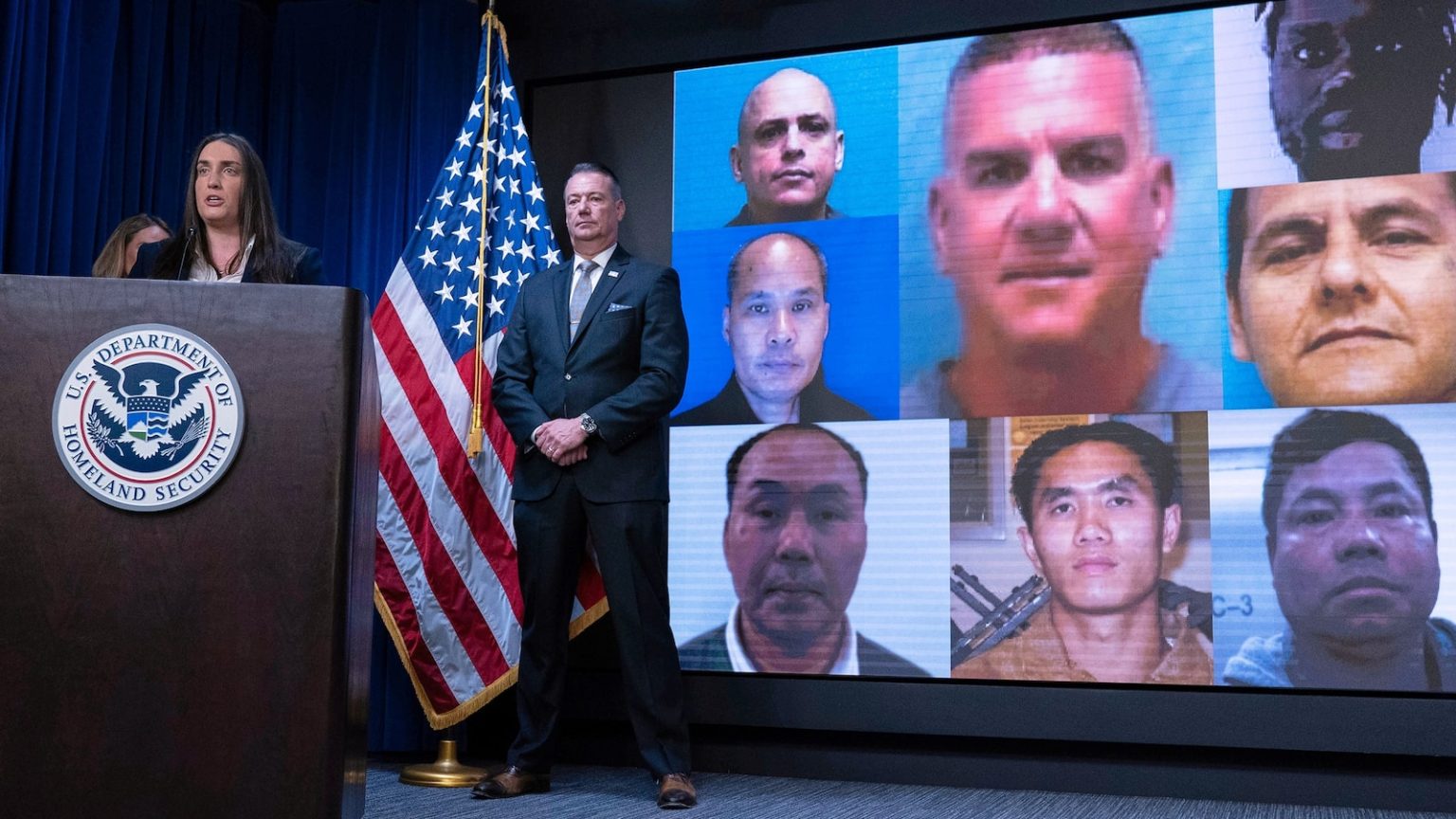A federal judge in Boston ruled Wednesday that the Trump administration’s deportations of eight men convicted of violent crimes to South Sudan “unquestionably” violated an earlier order by not giving them adequate due process, including a “meaningful opportunity to object” to their removals to a country other than their own.
However, Judge Brian Murphy, of the U.S. District Court for the District of Massachusetts, did not order the return the plane with the deportees to the United States, as the plaintiffs had requested.
Instead, the judge appeared willing to take the Trump administration at its word that it would be possible for the government to conduct interviews with the detainees to determine if they have a reasonable or credible fear of being deported to South Sudan.
In a follow-up series of orders issued late Wednesday evening, Murphy laid out requirements the government must meet for doing so, saying the government is mandated to give migrants a minimum of 10 days to raise concerns about safety risks they may endure if they’re sent to a third country. If the migrant is found to have a “reasonable fear,” Murphy said the government is required to reopen their immigration proceedings. If they don’t demonstrate a reasonable fear, the government must still provide a “meaningful opportunity, and a minimum of 15 days” to reopen their case.
In a memo clarifying his order, Murphy blasted the government’s apparent understanding of what “meaningful opportunity” meant when he initially issued an injunction last month limiting removals of migrants to third countries.
Department of Homeland Security Assistant Secretary Tricia McLaughlin and acting ICE Director Todd Lyons speak at a presser stating that eight individuals convicted of violent crimes were placed on a deportation flight from Texas headed to South Sudan, May 21, 2025.
Department of Homeland Security
“Giving every credit to Defendants’ account, the non-citizens at issue had fewer than 24 hours’ notice, and zero business hours’ notice, before being put on a plane and sent to a country as to which the U.S. Department of State issues the following warning: ‘Do not travel to South Sudan due to crime, kidnapping, and armed conflict,'” Murphy wrote. “As detailed on the record during today’s hearing, further facts regarding the unavailability of information, the hurried and confused notice that the individuals received, language barriers, and attorney access compound and confirm this Court’s finding that no reasonable interpretation of the Court’s Preliminary Injunction could endorse yesterday’s events.”
Department of Homeland Security Assistant Secretary for Public Affairs Tricia McLaughlin called the judge’s ruling “deranged” in a statement late Wednesday night.
“These depraved individuals have all had their day in court and been given final deportation orders,” she said in the statement. “A reminder of who was on this plane: murderers, child rapists, an individual who raped a mentally & physically disabled person. The message this activist judge is sending to victims and their families is we don’t care. President Trump and Secretary Noem are working every day to get vicious criminals out of our country while activist judges are fighting to bring them back onto American soil.”
In a court hearing earlier Wednesday, attorneys for the deported men argued the plane should be returned to the U.S. and the men should be afforded the due process that “can only take place on U.S. soil,” said Trina Realmuto, the executive director of the National Immigration Litigation Alliance.
Under the circumstances, it would be a “legal and logistical nightmare” for the detained men to get access to counsel and to obtain the information they need to present a challenge, she said.
“I have some serious confidentiality, privacy concerns about where this reasonable fear interview is going to take place,” she said. “Who is going to conduct this reasonable fear interview, but most importantly, how are they going to have access to counsel, which they are entitled to have in order to discuss the reasonable fear process? How are they going to investigate and learn about the conditions in South Sudan? How are they going to present evidence that they have a reasonable fear.”
Realmuto also raised concerns about finding interpreters and conducting interviews with U.S. Citizenship and Immigration Services personnel remotely across multiple time zones.
Deputy director of U.S. Immigration and Customs Enforcement Madison Sheahan, with Acting director of U.S. Immigration and Customs Enforcement Todd Lyons, speaks during a news conference at ICE Headquarters, in Washington, May 21, 2025.
Jose Luis Magana/AP
In his order, Murphy laid out the requirements for the interviews, saying they must be done in private, with access to lawyers and an interpreter, and necessary technology access “commensurate with the access they would receive were they in DHS custody within United States borders.”
During the court hearing earlier, the judge said he wanted the interviews to take place in an “appropriate place with an appropriate degree of privacy,” even if that means “renting a room at a Holiday Inn.”
Murphy’s order also said the migrants and their lawyers must be given no less than 72 hours notice that a reasonable fear interview has been scheduled.
On Tuesday, Murphy had issued an order directing the government to maintain custody of anyone covered by his preliminary injunction who is in the process of being removed to South Sudan or any other country “to ensure the practical feasibility of return if the Court finds that such removals were unlawful.”
In a news conference earlier Tuesday, DHS confirmed that eight migrants were placed on a deportation flight from Texas headed to war-torn South Sudan on Monday, though they cautioned this would not be the migrants’ final destination.
McLaughlin, the DHS spokesperson, told reporters at that news conference that “no country on earth wanted to accept them because their crimes are so uniquely monstrous and barbaric.”
Several of then men were convicted of first-degree and second-degree murder, according to information released by DHS.
Kyaw Mya, a citizen of Burma, was convicted of lascivious acts with a child-victim less than 12 years of age. Nyo Myint, a citizen of Burma, was convicted of first-degree sexual assault involving a victim mentally and physically incapable of resisting.
Another was convicted of robbery, possession of a firearm and driving under the influence.
“A local judge in Massachusetts is trying to force the United States to bring back these uniquely barbaric monsters who present a clear and present threat to the safety of the American people and American victims,” McLaughlin said during the news conference. “While we are fully compliant with the law and court orders, it is absolutely absurd for a district judge to try and to dictate the foreign policy and national security of the United States of America.”
When asked where the eight men were, McLaughlin said she couldn’t “disclose where their current whereabouts are right now” but that they were still in DHS custody. Officials declined to identify their final destination, citing security concerns.
“I would caution you to make the assumption that their final destination is South Sudan. As far as that agreement goes, I would definitely refer you to the State Department’s more specifics,” she added.
Officials said the men’s countries of origin refused to accept them, so DHS in partnership with the State Department found a country that would accept them through a “safe third-country agreement.”
“I can say that their home countries refuse to take these individuals back,” acting U.S. Immigration and Customs Enforcement Director Todd Lyons said.
Photos released by DHS of deportees, top L-R: Nyo Myint, Burma, Enrique Arias-Hierro, Cuba, Jose Manuel Rodriguez-Quinones, Cuba, Tuan Thanh Phan, Vietnam, bottom L-R: Thongxay Nilakout, Laos, Jesus Munoz-Gutierrez, Mexico, Dian Peter Domach, South Sudan and Kyaw Mya, a citizen of Burma.
DHS
“ICE detention isn’t punitive. We detain and remove after six months or 180 days. If we don’t have a country that’ll take their citizens back, we do have an option to find a safe third country,” Lyons said.
However, McLaughlin argued to reporters that the eight migrants were given due process.
“We are following due process under the U.S. Constitution. These individuals have been given and their lawyers have been given plenty of prior notice. As far as those actual agreements, we can get back to you with more information from the State Department,” she said.
Outside the courthouse on Wednesday, lawyers for the migrants spoke to reporters saying South Sudan is a country to which the State Department advises Americans not to travel.
“They are categorically not safe,” Realmuto told reporters. “They are places where our class members are not safe, and they are not being afforded an opportunity to consult with counsel and to make an informed choice about the fear that they have of being deported to those countries.”
Attorneys also said they have concerns for over the conditions the migrants, who continue to be held on a tarmac, are experiencing.
“Nobody is able to consult with them from where they are at the moment, and that includes counsel for the one person who actually had counsel at the time of his removal,” Anwen Hughes, director of legal strategy at Human Rights First, told reporters Wednesday after the hearing.
ABC News’ Ely Brown contributed to this report.


